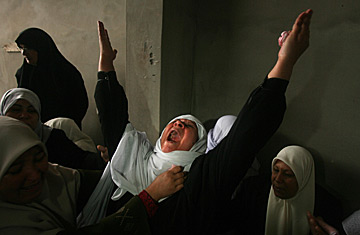
Relatives of the Atallah family mourn after six family members were killed during an Israeli air raid in Gaza City, March 2, 2008.
Tit-for-tat clashes in Gaza may escalate into the next quagmire in the Israeli-Palestinian conflict. Before the current fighting started, Israeli officials privately scoffed that they could live with an occasional Hamas or Islamic Jihad rocket fired into their territory by the Palestinian militants in Gaza. But that changed last week when Hamas, angered at the loss of five senior commanders in an Israeli air strike, began targeting Ashkelon again, sending a dozen powerful Grad missiles into the Israeli port roughly five miles from Gaza's northern frontier. In retaliation, the Israelis stormed into northern Gaza.
On Saturday, Palestinian President Mahmoud Abbas suspended contact with Israel, as fighting between Israeli forces and Palestinian militants raged on for a second day, leaving nearly 70 dead and hundreds more wounded. Abbas' walk-out may doom the visit this week by U.S. Secretary of State Condoleezza Rice who was due to fly into the Middle East to provide impetus for peace talks between the Israelis and the Palestinians. "In light of the Israeli aggression, such communication has no meaning," said Abbas' spokesman, Nabil Abu Rudeina.
Abbas had no choice, say Palestinians. Even though Gaza is ruled by Abbas' Hamas rivals, pro-Gaza demonstrations have spread throughout the West Bank towns and cities under Abbas' control, with Palestinians there clashing with Israeli riot police. Many of the slogans they shouted were against Abbas, who is seen by many Palestinians as too pro-Israeli.
The brunt of the fighting occurred on Saturday when Israelis, in an operation named "Warm Winter," stormed into northern Gaza with over a thousand troops backed by 30 tanks and helicopter gunships. They advanced to the edge of Jabaliya, a crowded refugee camp, and there took fire from gunmen hiding inside the buildings. After two Israeli soldiers were shot, eyewitnesses say, the Israelis retaliated with withering fire in all directions as they struggled to evacuate the wounded soldiers, who eventually died.
On the Palestinian side, medical sources say that 25 of those killed were militants, the rest civilians, including women and children. Despite the fierce Israeli assault, militants kept firing a barrage of mortars and longer-range Katyusha rockets into southern Israel.
The Israeli attack on Gaza came after an Israeli student was killed in a rocket blast, and the port city of Ashkelon, with 120,000 residents, came under attack, showing Israelis for the first time that the militants of Hamas and Islamic Jihad had acquired a large arsenal of accurate, longer-range rockets. One Hamas commander told TIME by telephone: "It's true that we're losing lives but we'll prove to the Arab world that we have the power to stand up to Israel." The Israeli combat brigade withdrew from northern Gaza early Monday morning, even as another rocket struck Ashkelon. Nevertheless, Israeli military spokesmen said Operation Warm Winter had succeeded in clearing out most of the area used by militant rocket launchers.
There could be bigger battles to come. Israeli Prime Minister Ehud Olmert waved off calls of restraint from United Nations Secretary General Ban Ki-Moon who equally condemned both Israel for "excessive and disproportionate" use of force in Gaza and the militants for their unending barrage of rockets into southern Israel. Israeli Defense Minister Ehud Barak said, "We are not happy about civilians being hurt in Gaza. Hamas and those who fire rockets at Israel are responsible and they will pay the price." If anything, the Israeli assault has steeled Gazans' support for Hamas. As one housewife in Jabalya watched the injured victims of an Israeli air strike being carted into an ambulance, she shouted, "Keep hitting them with rockets. Take revenge for our children." Military sources say that after the initial thrust, the cabinet is now deciding whether to pull back or go into Gaza much harder and deeper, with division-strength troop numbers, to crush Hamas' organization and leadership. This is likely to be postponed until after the U.S. Secretary of State returns home, probably empty-handed, from her talks with Olmert and Abbas.
On Saturday night, Israeli warplanes bombed the office of Hamas Prime Minister Ismael Haniyeh. He and other political and military leaders have gone into hiding. They fear, with good reason, that they will be targeted by an Israeli missile strike. The two choices facing Israeli are equally unpalatable: either negotiate with Hamas, considered a terrorist organization, or try to reconquer Gaza, with its hostile 1.5 million population, and get mired in a long and bloody assault, a mini-Iraq.
